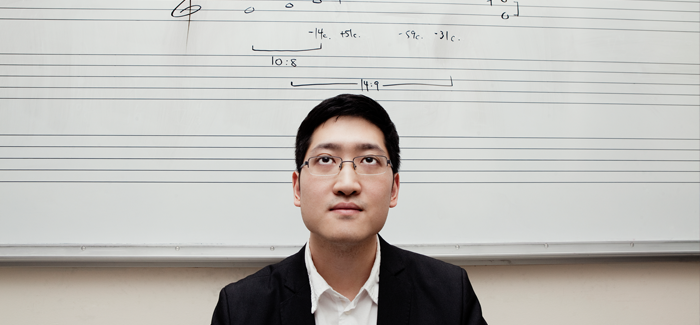
Composer Anthony Cheung uses mathematics to transform harmony and timbre, fusing instruments with one another. (Photography by Drew Reynolds)
The harmonic convergence of mathematics and music.
Anthony Cheung’s formal mathematical training essentially ended with high school calculus. But as a musician and composer, he’s still exploring mathematical phenomena, especially their influence on harmony and timbre.
During the late 20th century, composers used mathematical concepts to fuse the two musical qualities, says Cheung, assistant professor of music. “Through technology and thinking about acoustics,” he adds, “we can change sounds on the computer in innumerable ways.”
Cheung’s work shows the power of mathematics to open new possibilities in music. Modern experiments with computer music are just the most recent example. According to musician-scholars like Eugenia Cheng, a concert pianist and visiting senior lecturer in mathematics, the history and practice of music would have unfolded much differently without an appreciation of what unites music and math.
During the Baroque period, a mathematical breakthrough inspired Johann Sebastian Bach to write The Well-Tempered Clavier (1722), his book of preludes and fugues in all 24 major and minor keys. Bach was able to write in every key so successfully because mathematicians found better ways to calculate the 12th root of two. This is related to the musical problem of dividing the octave into 12 equal intervals, which involves splitting sound waves into ratios rather than equal lengths. “That’s why music before the Baroque time didn’t really modulate,” Cheng says. “It always stayed in the same key. Because of the way that they tuned keyboards, if they moved a key it would have sounded terrible.”
Cheng, whose home institution is the University of Sheffield, spent 2004 to 2006 as an L.E. Dickson Instructor at UChicago and returned as a visiting lecturer from September 2013 through December 2014. As an educator, Cheng can relate just about anything to mathematics, including food. She developed a series of YouTube lectures on the mathematics of food, covering topics such as “the perfect puff pastry,” “the perfect Mobius bagel,” and “the perfect way to share a cake.” The series evolved into a book, How to Bake Pi, which will be published by Profile Books in March.
Cheng specializes in category theory, which she characterizes as “the mathematics of mathematics”—techniques that entail extracting problems from science or life and asking if they contain common elements that can be studied apart from their real-life contexts. “Category theory was only really needed when mathematics reached a certain state of complexity, and that was in about the ’40s and ’50s,” Cheng says. That’s when the field was pioneered by UChicago’s Saunders MacLane and Columbia University’s Samuel Eilenberg.
On the other side of the equation, composer and musician Cheung, who received a 2012 Rome Prize in musical composition from the American Academy in Rome, explains how an understanding of mathematics can lead to a deeper musical appreciation. In graduate school Cheung studied with composer Tristan Murail, now a professor emeritus of music at Columbia, who developed ideas about how harmony and timbre—the texture of a tone, distinct from pitch or volume, which suggests its vocal or instrumental source—could come together. Cheung cites composer Jonathan Harvey’s Mortuos Plango, Vivos Voco (1980) as a classic early example of combining harmony and timbre electronically. In this work, Harvey used spectral analysis and resynthesis on a computer to morph the sounds of the tenor bell at Winchester Cathedral, one of the largest in England, into the sound of a singing boy, his son.
“Like all music that concerns itself with harmony,” Cheung says, spectral music is related to mathematics. Composers of spectral music mathematically analyze sound spectra and observe how they behave and how they’re related, which provides the basis for transforming their harmony and timbre.
Murail, for example, is fascinated by bell sounds. “Tristan has had very precise tools to measure these sonorities,” Cheung says. “He might use a recording—for example, of Mongolian overtone chanting—and then actually plug it into the computer to see what’s there. From there he might re-orchestrate a passage for instrumental ensemble.”
Cheung also morphs one sound into another in his own work. “I do this mostly intuitively, I have to say, and without the aid of software when I’m writing purely for acoustic instruments,” he says. “But I’m also familiar with some of the technology that allows you to look at sounds on the computer. It’s certainly changed the way I think about sound, even when I’m not using any program.”
He conducts experiments in crossing timbres, as do other composers. When, for example, can the sounds of a piano and a violin completely fuse? “They’re such different instruments. One is sustained and vibrated. The other is attacked and decayed,” Cheung notes. “And yet we can somehow put them together in this grey area where they might be able to sound ambiguous with one another.
“With technological and mathematical tools, we are able to have control of both precision and ambiguity. Knowing about acoustics and timbre can lead us to the resynthesis of sounds we already know, and to tuning with a fine-tooth comb. But then combining these sounds or altering them in ambiguous ways can lead to exciting discoveries, making us listen in unfamiliar ways.”
